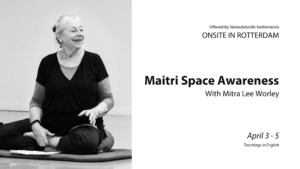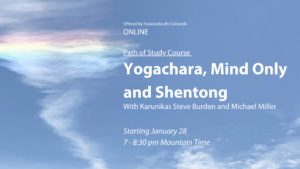When we are going through a difficult time, we often think “why me?” But this doesn’t bring any relief. Wallowing in feeling sorry for ourselves only increases our suffering. Whenever I get stuck in “why me?” I notice that my stomach tightens, my world becomes small, and I can’t see the whole picture. In my tunnel vision, I lose all perspective and spaciousness, and my compassion and sense of connection go out the window.
Buddha taught in the Four Noble Truths that the cause of our suffering is clinging to a belief that we are something solid and permanent, that our “self” is something special that needs to be protected. When we think that we exist in a permanent way, we close down our options to change and adapt. When we believe that we are in the middle of it all, we suffer greatly. As Jack Kornfield says in A Path with Heart: A Guide through the Perils and Promises of Spiritual Life:
When the Buddha confronted the question of identity on the night of his enlightenment, he saw into the human tendency to identify with a limited sense of existence and discovered that this belief in an individual small self is a root illusion that causes suffering and removes us from the freedom and mystery of life.
Reminding ourselves over and over again that the self does not exist as a separate entity is the path out of suffering. Remembering that we are just one person among many puts our suffering into perspective.
It can be easy for me to fall into self-pity. I find myself clinging to a solid sense of self when I experience physical or emotional pain. But when I apply what I have learned in my longtime Buddhist practice, I can let go of my self-clinging and self-pity, and I can experience compassion for all suffering beings, including myself. My thoughts of “why me?” then transform into “yes, everyone.” My tunnel vision then opens into spaciousness and what Kornfield calls the “freedom and mystery of life.” I feel less alone and have a sense of belonging.
Here’s an exercise you might try when you experience suffering and self-pity:
Exercise
1. Notice what is happening in your body. Is there perhaps a tightening in your chest or stomach or a feeling of heaviness?
2. Breathe into those tight or heavy places, and ask, “Where is my ‘self’? Is it in my arms? My legs? My head? My torso?” When you don’t find it anywhere, let go and relax.
3. From that space of relaxation, expand your awareness to take in all beings who are suffering, and say to yourself, “Yes, everyone.” You can repeat these words throughout the day as a reminder that you are not alone in your suffering.
4. Breathe out light and healing toward everyone who is suffering, including yourself, and relax into a sense of spaciousness.

Beth Patterson is a psychotherapist specializing in grief, loss and life transitions. In her work, Beth relies on Buddhist psychology, mindfulness based cognitive therapy and body-centered therapies. Her articles and ebook are available at www.bethspatterson.com. Beth is a longtime Buddhist practitioner and a student of Dzogchen Ponlop Rinpoche.






